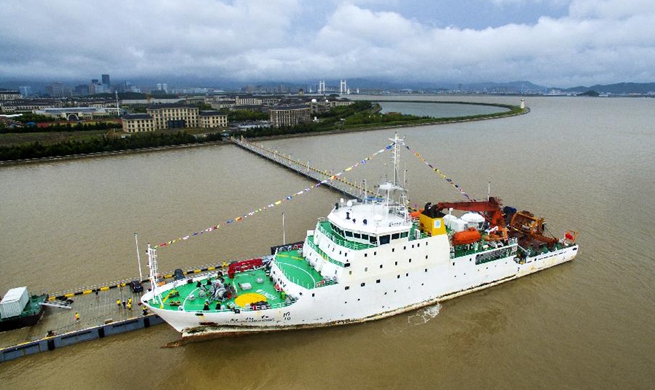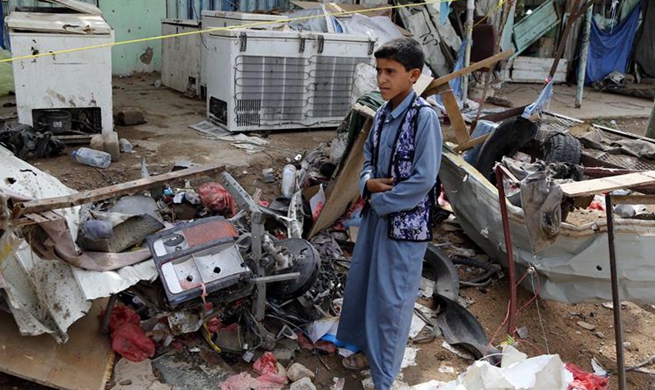BEIJING, Aug. 13 (Xinhua) -- The heads of all five countries bordering the Caspian Sea on Sunday signed a landmark convention on the legal status of the world's largest inland body of water after two decades of negotiations, settling a long-standing dispute over whether the Caspian is a sea or a lake.
In addition, six documents for strengthening cooperation among the bordering countries were also signed at the Fifth Caspian Summit in the Kazakh city of Aktau.
The convention banned non-littoral states from deploying military force on the sea, which essentially prevents external countries from intervening in regional issues with military power, and finally laid a legal foundation for the cooperative development of the offshore gas and oil reserves.
PROSPECTS FOR COOPERATION AMONG CASPIAN STATES
The convention defined and regulated the rights and obligations of the littoral countries with respect to the use of the Caspian Sea, including its waters, bottom, subsoil, natural resources and airspace over the region. However, it neither defined the Caspian Sea as a sea nor as a lake.
According to the convention, the 15 nautical miles of waters extending from the coastline of the Caspian Sea countries are the territorial waters of a country. The waters extending beyond the territorial sea for 10 nautical miles are the exclusive fishing areas of the country. The other water bodies and the fishery resources of these water bodies will be jointly owned by the five countries along the Caspian Sea.
The convention also clarified the right of the littoral states to lay underwater pipelines, which means the parties may lay underwater cables and pipelines along the bottom of the Caspian Sea, subject only to the agreement of the states whose sectors the pipelines or cables will pass through.
In addition to the convention, the five states also signed agreements to enhance cooperation in areas of transportation, trade, economy and anti-terrorism.
The signing of the documents will enhance mutual trust and cooperation among the Caspian countries, consolidate regional security and stability, and enhance the competitiveness of the Caspian countries, said Russian Deputy Foreign Minister Grigory Karasin.
The documents will also help the Caspian countries attract foreign investment, facilitate the implementation of their joint development projects and reduce various risks in the region, he added.
Zhumabek Sarabekov, a research fellow with the Institute of World Economics and Politics under the Foundation of the First President of the Republic of Kazakhstan, said the convention will remove many of the contentious issues which have been preventing effective cooperation among the Caspian countries.
Andrei Grozin, a Russian expert on international issues, believes that the convention has at least provided the Caspian countries with a legal basis for solving various problems.
With a series of transport and logistics cooperation expected to be implemented in the Caspian countries in the future, Grozin estimated that the dialogue mechanism among the five heads of the Caspian states is very likely to evolve into a regional forum or organization.
Rasim Musabekov, a member of the Azerbaijani parliament, said the signing of the convention would significantly ease tensions between Azerbaijan, Iran and Turkmenistan over the division of underseas resources in the waters south of the Caspian Sea.
Meanwhile, the presidents of the five Caspian states have begun to look forward to the benefits of increased cooperation among nations.
Turkmen President Kurbanguly Berdymukhamedov said Turkmenistan hopes to export gas to European countries in the future. Meanwhile, Russian President Vladimir Putin suggested the Caspian countries strengthen cooperation in such areas as transportation and tourism.
He also suggested that the Caspian countries strengthen foreign policy coordination, and that the intelligence agencies and border agencies of the Caspian countries strengthen cooperation to cope with the complex situation in the surrounding region.
Kazakh President Nursultan Nazarbayev, for his part, wanted the five Caspian countries to sign a treaty of mutual military trust.
FOREIGN MILITARY FORCES BANNED FROM ENTERING CASPIAN SEA
The convention stated that non-Caspian countries are banned from stationing troops in the Caspian Sea, and the Caspian states may not provide their territories to third countries for military operations that endanger other Caspian countries.
Iranian President Hassan Rouhani further disclosed the contents of the convention at a press conference, saying that non-Caspian countries are not allowed to have military bases in the Caspian Sea.
Their warships and submarines are not allowed to operate in the Caspian Sea, their aircraft are not allowed to fly over the Caspian Sea, and their military materials are not allowed to be transported through Caspian states, he added.
Consensus has been reached that the provisions are mainly aimed at North Atlantic Treaty Organization (NATO) countries led by the United States.
In recent years, some Caspian states have attempted to take advantage of outside forces to strengthen their own voice on the issue of the Caspian Sea, while Western countries, mainly the United States, expect to make full use of the Caspian countries to penetrate into the region.
As the dominant powers in this region, Russia and Iran have been worried that Western countries will expand their influence in the Caspian Sea. In particular, NATO plans to open a cargo transshipment center for the U.S. military in Afghanistan in the Caspian ports of Kazakhstan and Azerbaijan, causing great dissatisfaction and concern in Russia and Iran.
Against such a backdrop, the signing of this convention puts an end to external powers' attempts to expand their military presence in this region.













